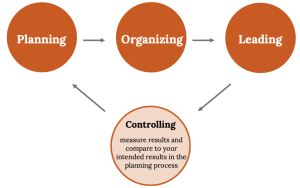7.7 What Do Managers Do?
Adapted by Stephen Skripak with Ron Poff
The Management Process
The effective performance of your business will require solid management: the process of planning, organizing, leading and controlling resources to achieve specific goals. A plan enables you to take your business concept beyond the idea stage. It does not, however, get the work done. For that to happen, you have to organize things effectively. You’ll have to put people and other resources in place to make things happen, and you will need to lead people in order to achieve these objectives. Finally, to know whether things are in fact going well, you’ll have to control your operations—that is, measure the results and compare them with the results that you laid out in your plan. Figure 7.2 summarizes the interrelationship between the functions that managers perform. Leadership as an overall concept has already been explored in detail, so this chapter will explore planning and controlling in some detail. Organizing is an especially complex topic, and therefore has an entire section, found in Chapter 8.
Don’t forget that in this note-taking venture your primary function is leadership. It may be that you feel confident to both lead and manage the organization – if so, great! Don’t forget that leadership is an ongoing function that you need to continue alongside your management role. Alternatively, you may decide to delegate to others who have the ability and capacity to be managers in this venture. If so, then they ideally incorporate some measure of leadership into their work, aligning their efforts to the greater vision of the business, and communicating that vision in a winning way. People whose role consists entirely of management, without any element of leadership, can be described as either bureaucrats or technocrats depending on whether they get their authority from rules or from their expertise. In most situations, this is not the ideal approach to motivate people.

Key Takeaways
- The management process has four functions: planning, organizing, leading, and controlling.
An administrative official in a governmental or organizational hierarchy responsible for implementing policies and managing services according to established rules and procedures. Can be a neutral term but is often used pejoratively.
An expert in a technical or scientific field employed to solve complex problems through data-driven decision-making and specialized knowledge. Can be a neutral term but is often used pejoratively.

